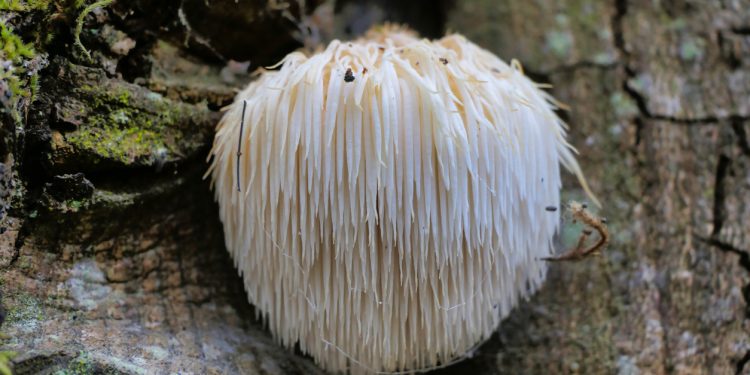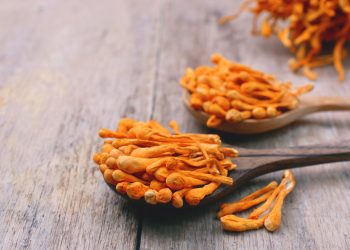If you’ve been following our blog for any length of time, you’ll probably be aware that we’re big fans of using organ meats to optimise workout performance, skin health, and immune health.
But did you know that there’s a single mushroom species that accomplishes something similar?
It’s true — known as Lion’s Mane, this unique mushroom doubles as an all-purpose adaptogen. In this article we’ll be diving deep into the many benefits of Lion’s Mane. Keep reading if you’re interested in improving your immunity, boosting your brain, increasing your athletic recovery, and much, much more.
- What is Lion’s Mane?
- Lion’s Mane Mushroom Benefits
- Top Five Benefits of Lion’s Mane
- The Sunshine Hormone
- Enhanced Brain Function
- Reduced Cancer Risk
- Improved Heart Health
- Less Chronic Inflammation
- Lion’s Mane Mushroom Q&A
- What to Look For in Premium Lion’s Mane Supplements
What is Lion’s Mane?
True to its name, Lion’s Mane is a fungal species whose fruiting bodies resemble the scruff of a lion. Could this be nature’s way of hinting to us of its power? Maybe so. Lion’s Mane has held almost sacred status among early medical practitioners for thousands of years, and today modern medicine is slowly but surely validating more and more of its benefits. Among the many highlights are neuroprotection, anti-tumour action, and dozens of other health-promoting shifts.
Known in Latin as Hericium Erinaceus, in Chinese as Hou Tou Gu, and in Japanese as Yamabushitake, Lion’s Mane is especially popular in Asia. In some parts of China, it’s colloquially called Hedgehog Mushroom, and in virtually all of China, it’s revered as a staple of TCM (Traditional Chinese Medicine).
TCM practitioners claim Lion’s Mane replenishes and nourishes all five key internal organs — the liver, lungs, heart, spleen, and kidneys. These practitioners have long held that Lion’s Mane can be used to correct a deficiency of Qi, or ‘life force energy.’ Buddhist Monks used it to amplify the power of their meditation sessions; some other Monk sects go so far as to wear furry strands that look like Lion’s Mane’s outgrowths. [1]
In recent decades Lion’s Mane’s popularity has spread worldwide. Today it’s grown throughout the US and Europe by hobbyists and supplement makers, usually in a sawdust substrate.
Lion’s Mane Mushroom Benefits
In even more recent times the scientific community has started to catch on to Lion’s Mane’s health benefits. A 2015 study attests that the mushroom may have an incredible spectrum of health-promoting properties: [2]
- Antibiotic
- Anxiolytic
- Antidiabetic
- Anti-fatigue
- Anti-depressant
- Neuroprotective
- Anticarcinogenic
- Antihypertensive
- Cardioprotective
- Hepatoprotective
- Nephroprotective
- Anti-hyperlipidemic
- Anti-senescence [anti-ageing]
Some of Lion’s Mane’s qualities still need to be validated by more clinical trials, but the shroom’s evidence-based benefits are growing as we speak! Below are five of its top health highlights.
Top Five Benefits of Lion’s Mane
- Sunshine in a Shroom
- Enhanced Brain Function
- Reduced Cancer Risk
- Improved Heart Health
- Less Chronic Inflammation
- Sunshine in a Shroom
Did you know that mushrooms are the only source of produce that provides eaters with Vitamin D? Mushrooms synthesise vitamin D from sunlight much the same way we do. Consistently eating sun-kissed shrooms can elevate your body’s own vitamin D levels.
Adequate vitamin D levels, in turn, are associated with: [3]
- Improved calcium transport
- Reduced risk of osteoporosis
- Reduced risk of falls in the elderly
- Protection from certain cancers
- Protection from cardiovascular disease
- Protection from respiratory illness (esp. in children)
- Protection for diabetic complications
- Protection from neurodegeneration
Lion’s Mane’s vitamin D content is especially important given that many people are deficient in it. It’s estimated that 1 billion people are vitamin D deficient worldwide. Correcting this deficiency may be as simple as supplementing with Lion’s Mane and other types of mushrooms.
In addition to being rich in vitamin D, Lion’s Mane mushrooms are high in iron, potassium, calcium, and much more.
- Enhanced Brain Function
If we could only highlight a single benefit of Lion’s Mane, we’d probably choose to highlight this one. Lion’s Mane can elicit positive change in almost anyone who uses it — regardless of their current state of mental health.
Lion’s Mane’s brain-boosting power comes from two classes of compounds: erinacines and hericenones. These compounds readily pass through the blood-brain barrier into the brain, where they upregulate something called nerve growth factor, or NGF. This upregulation can lead to: [4]
- Improved creativity
- Improved neuroplasticity
- Improved neuroprotection
Studies show that Lion’s Mane may enhance “neurite outgrowth” within the brain and other parts of the central nervous system. If the brain’s neurons are likened to a tree, Lion’s Mane supports both the tree’s outward growth and its pruning schedule. [5]
This ‘pruning’ property is an especially big deal for those with Alzheimer’s disease or Parkinson’s disease. A 2012 study done in Malaysia found that Lion’s Mane may help regenerate damaged cells within the nervous system. [6] If it can do this, might it also help reverse cellular degeneration of brain diseases?
Maybe. A growing number of neuroscientists advocate for using Lion’s Mane and other adaptogenic mushrooms as a preventative safeguard against neurodegeneration of all sorts. According to mycologist Paul Stamets, a nootropic stack of Lion’s Mane + B vitamins may be enough to counteract brain neuropathy. [7]
Lion’s Mane may also help with:
- Mild cognitive impairment. 8-16 weeks of Lion’s Mane supplementation may help the brain overcome environmentally-induced cognitive problems.
I
- Ischemic injury. This type of neuronal damage is marked by chronically low blood flow to certain regions of the brain. Some studies hint that Lion’s Mane may help prevent ischemic injury.
- Parkinson’s disease. Animal research shows that Lion’s Mane may halt the progression of Parkinson’s. As exciting as this is, more research is still needed, as it’s not yet known if the mushroom can reverse existing neurodegeneration.
Don’t think that you need to be on the path towards brain disease to benefit from Lion’s Mane supplementation. Even people with normal brain function can use Lion’s Mane to improve their cognitive function and reduce stress. It’s popular among athletes, gamers, businesspeople, entrepreneurs, and anyone else who seeks a natural boost.
- Reduced Cancer Risk
Lion’s Mane may also reduce one’s risk of developing various types of cancer. Studies show that the mushrooms’ cerebrosides, or nerve-strengthening lipids, may inhibit the formation of blood vessels within cancer cells. The types of cancer Lion’s Mane may help with include: [8]
- Blood cell cancer (Leukemia). Studies out of South Korea have found that Lion’s Mane has “therapeutic potential against human leukemia.” [9]
- Stomach cancer. Other studies have found that Lion’s Mane may cause apoptosis, or cell death, in gastric cancer cells. This one’s authors concluded that “[Lion’s Mane extract] may be taken as a potential candidate for treating gastric cancer.” [10]
- Lung cancer. Both in-vitro and animal studies show that Lion’s Mane may help fight off lung cancer. One study found that Lion’s Mane extract inhibited metastasis of cancer into the lungs by 66-69%. [11]
- Other types of cancer. In other good news, Lion’s Mane extract may take the sting out of breast cancer, colon cancer, liver cancer, and cervical cancer. You’d be hard-pressed to find a natural product with anti-tumour qualities as broad as this one.
- Improved Heart Health
Lion’s Mane also has cardioprotective qualities. It may simultaneously reduce ‘bad’ cholesterol, increase ‘good’ cholesterol, and clear triglycerides out of the bloodstream.
And that’s not all. Lion’s Mane extract may also reduce one’s risk of blood clots, strokes, and other ailments. How does it do all this? One study determined that the hericenone B in Lion’s Mane “selectively inhibited collagen-induced platelet aggregation.” In other words, hericenone B prevented platelets from accumulating in the wrong places and causing problems. The sum result of all these shifts is a reduced risk of blood clots and strokes. [12]
- Less Chronic Inflammation
One of Lion’s Mane’s broadest benefits is its potential ability to reduce inflammation. Why’s this quality so important? Because chronic inflammation is a killer — it’s associated with everything from obesity to brain fog to heart disease to cancer. Any natural substance that can reduce inflammation with a minimum of side effects is deserving of more attention!
Lion’s Mane is one such substance. Studies show that it may reduce inflammation within fat cells, muscle cells, brain cells, macrophages, and other immune cells. Even more impressively, different fractions of Lion’s Mane confer different anti-inflammatory effects. Some of these effects likely haven’t even been discovered yet.
Last but not least, Lion’s Mane’s anti-inflammatory nature means it may be able to ward off h. Pylori. This quality might be especially important in today’s world of antibiotic-resistant bacteria and other super-pathogens. [13]
Lion’s Mane Supplements Q&A
What does Lion’s Mane do to the immune system?
Lion’s Mane appears to strengthen the innate immune system, preparing it to ward off harmful invaders. It may also help the body keep inflammation in check after an infection has occurred.
Does Lion’s Mane have side effects?
Generally speaking, no. Very, very few people experience side effects from Lion’s Mane.
What are Lion’s Mane’s active ingredients?
Lion’s Mane gets much of its power from its vitamin D, antioxidants, polysaccharides, beta-glucans, erinacines, and hericenones.
What does Lion’s Mane do to the brain?
Lion’s Mane is thought to help brain cells grow and restructure themselves.
What does Lion’s Mane do to the nervous system?
Lion’s Mane’s antioxidant activity means it may protect nerve cells from oxidation and other types of cellular wear and tear.
How does Lion’s Mane grow?
Like most other mushrooms, Lion’s Mane starts as borderline-invisible mycelium before developing its characteristic fruiting bodies.
What are the benefits of Lion’s Mane? Does it improve brain health?
Don’t think that Lion’s Mane’s benefits are merely placebo — they’re almost too numerous to mention here! All in all Lion’s Mane may:
- Provide vitamin D, antioxidants, and other hard-to-get nutrients
- Improve various aspects of brain health in the healthy and the sick
- Reduce cancer cell growth, proliferation, and malignancy
- Improve some of the most important cardiovascular health markers
- Reduce chronic inflammation and improve athletic performance
What to Look For in Premium Lion’s Mane Supplements
Not all Lion’s Mane products are created equal. For this reason, we’d encourage you to find a product that’s:
Third-Party Tested
Think of independent lab testing as proof of a product’s validity. Without such testing, it’s hard to know exactly what you’re getting.
Cleanly Extracted
Many of the studies we mentioned above used an ethanol-based Lion’s Mane mushroom extract to make their findings. Powdered Lion’s Mane products are another great choice.
Pure from Pollutants
Make sure any product you’re looking at is verifiably free from glyphosate and heavy metals…before you buy.
Grown in Europe
Not all of us have the time or know-how to voyage off into the forest and harvest fresh Lion’s Mane. The good news, however, is that we can settle for the next-best thing: 100% organic Lion’s Mane powder grown and produced by some of Europe’s best cultivators.
Lion’s Mane Mushroom Benefits: Closing Thoughts
Lion’s Mane is right up there with reishi when it comes to the most dynamic medicinal mushrooms. With benefits like increased vitamin D intake, greater cognitive function, cancer risk reduction, improved heart health, and inflammation reduction, there’s no reason not to try Lion’s Mane for yourself. It may very well revolutionise your overall wellness to the next level.









